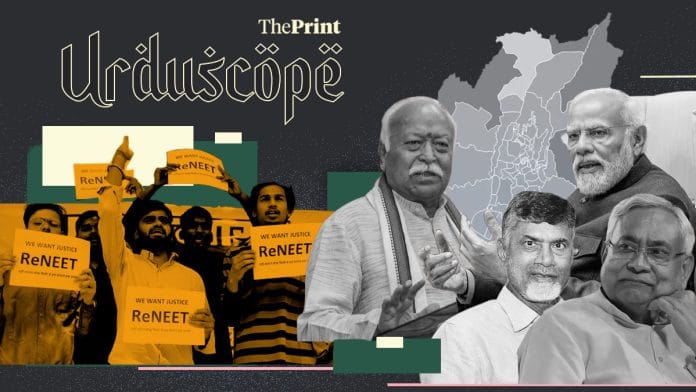New Delhi: From the BJP to the Sangh Parivar, to Rahul Gandhi’s increasing popularity, the ongoing fiasco over the NEET results and the abject lack of Muslim representation in Prime Minister Narendra Modi’s cabinet — here’s a round-up of news that made it to the front pages and editorials of the Urdu newspapers this week.
RSS and BJP
On 12 June, an editorial in the Roznama Rashtriya Sahara said what RSS chief Mohan Bhagwat has said about the BJP and Prime Minister Narendra Modi’s silence on the Manipur issue is a major warning for the new NDA government. Moreover, the conduct displayed by the RSS chief in his address indicates that this time, with a clear majority still out of reach, the BJP will face opposition and criticism not only from its allies, but also from the RSS.
However, the editorial further said, this resistance and criticism will not weaken the government because the BJP is a political party born from the RSS, working to implement the Sangh’s ideology in the country. The truth is that Bhagwat is only playing the role of an affectionate father, nudging the BJP to course-correct. This is to ensure that such mistakes are not repeated and the BJP does not suffer political damage in the future.
Rahul Gandhi
On 13 and 14 June, editorials in Inquilab discussed Congress leader Rahul Gandhi’s rising popularity. The 13 June editorial posed the question of whether his popularity had increased, adding that even his opponents would agree.
The rise in Rahul’s popularity shows his efforts to prove himself are succeeding, even recognised by institutions “accused of vested interests”, said the Inquilab editorial.
A 14 June Inquilab editorial said that the enthusiasm generated among Congress workers due to the Bharat Jodo Yatra or similar initiatives needs to be channelled into effective planning and implementation. Without this, Rahul Gandhi and his party will not be able to strengthen their credibility. Many of the party’s state units are in a dilapidated condition, it is the responsibility of the party leadership to rectify this and ensure that public work is done there, the editorial further said.
Posing questions to the government is very important and necessary, but that will not win it elections, the editorial said, adding that until the Congress starts winning in elections, it cannot be considered strong.
Modi’s new tenure and cabinet
On 14 June, a Siasat editorial criticised the BJP for not inducting Muslims in the Modi 3.0 cabinet. It highlighted the BJP’s practice of ticket distribution based on religion and caste, contrary to claims of meritocracy. The editorial emphasised BJP’s “biased” approach, evident in cabinet formations where caste considerations prevail while Muslims are sidelined. It called upon coalition partners like Telugu Desam Party (TDP) chief Chandrababu Naidu and Janata Dal (United) chief Nitish Kumar, who claim secularism but have not addressed Muslim representation in the cabinet, to exert pressure for social justice and inclusive governance.
Recalibrating Hindutva in Modi 3.0
On 13 June, a Siasat editorial emphasised that without strong minority support, the TDP wouldn’t have achieved its current success. With Chandrababu Naidu back in power, his responsibilities have grown significantly. Besides economic stability and securing central funds, Naidu’s top priority includes ensuring Muslim security and honouring his commitment to reservations, a critical issue in Andhra Pradesh affected by BJP’s politicisation. Naidu, known for his secular values, must handle this matter with utmost care to maintain minority trust, the editorial stated.
On 12 June, an Inquilab editorial asked whether the new Modi government will differ significantly from those of 2014 and 2019, or continue to draw from the Hindutva cause and anti-minority groups. The editorial raised concerns about how the JD(U) and TDP would react if they maintained ambiguous statements or targeted minorities. It highlighted the absence of any Muslim representation in the Union cabinet and asked whether these (alliance) parties would address this issue in the future.
No ‘new’ government
On 13 June, a Sahara editorial noted that Modi, in his third term, has retained the same ministers in key departments, signalling no change in his governance style. Despite expectations that the JD(U) and TDP might influence changes, there were no issues in government formation or ministry distribution. Major ministries like home affairs, external affairs, defence, finance, and railways remain with the same ministers.
China — the curse of the third term
An 11 June editorial in Sahara noted that while the BJP achieved majorities in 2014 and 2019, it fell short this time, yet Modi remains PM. Modi faces challenges akin to those faced by Jawaharlal Nehru, including managing China, curbing Pakistan, balancing US-Russia relations, stabilising India economically and defence-wise, and promoting unity. Pakistan’s closer ties with China pose a significant concern. India’s permanent UN Security Council membership is crucial for addressing these issues and fostering development, the editorial further said. The Modi government, it added, has made progress by expanding BRICS and hosting the G-20 Summit, but the potential gains from these efforts remain uncertain.
“Despite not securing a majority, Narendra Modi faces challenges akin to Nehru, including dealing with China and maintaining balanced international relations,” said the editorial.
(Edited by Gitanjali Das)
Also Read: Temple, Hindu-Muslim politics fail, era of one-party rule ends — Urdu press on India’s mandate






